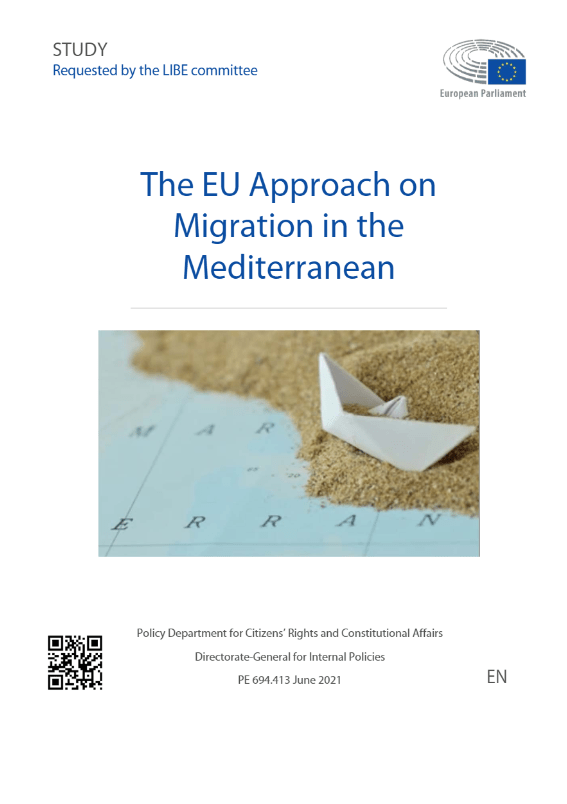Ahead of the Extraordinary Justice and Home Affairs Council (Home Affairs) of 25 November 2022, the Commission is presenting an EU Action Plan on the Central Mediterranean. Whilst emphasising that structural solutions will only be found through agreement on the full set of asylum and migration reforms currently being negotiated, the Commission is proposing a series of operational measures to address the immediate and ongoing challenges along the Central Mediterranean migratory route.
The Action Plan proposes a series of 20 measures articulated around three pillars that will be taken forward by the EU and its Member States. They are designed to reduce irregular and unsafe migration, provide solutions to the emerging challenges in the area of search and rescue and reinforce solidarity balanced against responsibility between Member States. The full Action Plan can be found here.

The EU approach on migration in the Mediterranean |
Pillar One: Working with partner countries and international organisations
Reinforced cooperation with partner countries and international organisations is key to address migration challenges. The EU will strengthen the capacities of Tunisia, Egypt and Libya to ensure better border management and management of migration. It will reinforce the fight against migrant smuggling and enhance diplomatic engagement on returns, while stepping up legal pathways to the EU. To coordinate these actions and maximise their impact, the EU will make better use of its coordination structures and launch a dedicated Team Europe initiative on the Central Mediterranean before the end of this year.
Pillar two: A more coordinated approach on search and rescue
The Action Plan proposes measures to strengthen cooperation between Member States and all actors involved in search and rescue activities in the Central Mediterranean, using the European Contact Group on Search and Rescue that was announced as part of the New Pact. Frontex, together with the concerned Member States, will carry out an assessment of the situation in the Central Mediterranean. Closer coordination will be ensured with the UNHCR and IOM. Discussions should also be promoted in the International Maritime Organization on the need for a specific framework and guidelines for vessels with a particular focus on search and rescue activities.
Pillar three: Reinforcing the implementation of the Voluntary Solidarity Mechanism and the Joint Roadmap
The Solidarity Declaration agreed on 22 June 2022 provides a voluntary and temporary mechanism for one year, bridging towards the future permanent system under the Pact. The Action Plan proposes to accelerate the implementation of the mechanism, including to provide swift support to Member States receiving arrivals by sea, enhancing flexibility, streamlining processes, and implementing the financing of alternative measures of solidarity.
Next Steps
The Commission will present the Action Plan to the Council in view of the Extraordinary Justice and Home Affairs Council (Home Affairs) on 25 November. The EU will remain vigilant about the developments on other key migratory routes to Europe including along the Türkiye/Eastern Mediterranean route, the Western Mediterranean/Atlantic route, as well as along the Western Balkans migratory route. In this respect, this Action Plan may serve as a model to develop similar plans addressing the specificities of other migratory routes.
Background
The Czech Presidency called for an Extraordinary Justice and Home Affairs Council (Home Affairs) following the increase in arrivals along the Central Mediterranean Route, with an increase of over 50% as compared to 2021 figures. Most of the people arriving on European shores risked their lives after hazardous journeys and search and rescue operations at sea.
Over the past years, the Commission has advanced on addressing the challenges through building targeted outreach towards third countries, such as Tunisia, Egypt and Bangladesh. The Commission has built strategic partnerships, including with Niger on fighting against smuggling as well as reinforcing capacities in partner countries, enhancing cooperation on legal migration and returns as well as addressing root causes. In addition, a Voluntary Solidarity Mechanism has been in operation since June to provide targeted solidarity to countries receiving a disproportionate amount of arrivals.
The October Justice and Home Affairs Council had addressed the recent evolutions in the Western Balkans migratory route, which has also recently seen a large increase in migratory movements. The discussion focused, in particular, on the visa policy of the Western Balkan region and the key areas for cooperation with the Western Balkan partners, identifying common initiatives to be deployed to step up European action.
The recent developments further underline the need to find sustainable and structural European solutions to our common challenges based on the comprehensive approach set out in the New Pact on Migration and Asylum proposed in 2020. It remains crucial to ensure the adoption of these reforms before the end of this legislative term.

Statement from Commission on migration and asylum |







Leave a Reply